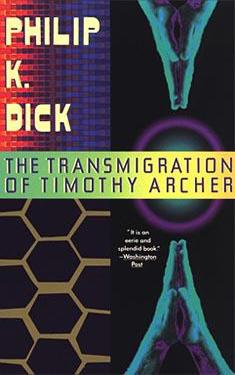Philip K. Dick
Completed 12/31/2017, reviewed 12/31/2017
4 stars
This book is considered the third book in the VALIS
trilogy. In actuality, the third book
was supposed to be The Owl in Daylight, but Dick died before he had outlined
the story. According to online sources,
though, he did once consider Transmigration to be part of the trilogy. While it doesn’t deal directly with his psychic/psychotic
event, it does deal with God, theology, and Gnosticism, topics which appeared
in the previous two novels. This book is
the most mainstream novel Dick ever wrote.
It has no science fiction element, but does have some speculative aspects.
It’s literary and intellectual, but
mostly accessible to the average reader.
It’s also the first time Dick has a woman as the main character of a
novel. I really enjoyed it, even though the
content is fairly tragic.
The plot is a little more straightforward than in the last
two books. Angel Archer goes to a
self-help guru on the day that John Lennon is shot and reflects on the previous
decade or so and her relationship to her husband, Jeff, his father and Episcopal
bishop of California, Timothy, and Timothy’s lover Kirsten Lundborg. Timothy Archer is based on Bishop James Pike,
a friend of Dick’s who died in the Dead Sea Desert. He’s the central figure in her relationships
as he draws everyone into his own personal existential crisis. He becomes privy to new scrolls found in the Dead
Sea caves which indicate that Jesus’ sayings may be two hundred years older
than Jesus himself. They are part of a
Gnostic tradition that points to some sort of Messianic event pre-dating
Christ.
I did a little reading of Bishop Pike’s life and found that Dick
didn’t just loosely base the book the Pike, he basically created a docudrama of
the bishop’s life. If you read about
Pike, you’ll have the plot of Transmigration.
What makes it interesting is that it is told from Angel Archer’s point
of view. Dick shares his own personal
theology through her and her interactions with the other characters. That’s what makes the book fairly intellectual. Yet the headiness doesn’t distract from the
story. Sometimes Angel’s thoughts get
pretty rambling, but they’re still interesting.
Dick also continues his exploration of mental illness. Kirsten’s son, Bill, is schizophrenic. He’s not a central character, but does come
into play more fully towards the end and has to do with the transmigration of
Timothy Archer’s soul. The best thing
about the character is that he’s quite real, and shown in quite a compassionate
light. We see him when he’s normal and
when he’s in the throes of his illness.
We know that Dick was quite possibly schizophrenic himself, and I have
to hand it to him for keeping his depictions of it based in reality and not in
fear.
I give this book four stars out of five. It kept me quite engrossed for two whole
days. I would have liked a little more
elaboration of the Gnostic scroll findings but what we get is pretty good. As I mentioned earlier, the book is quite
tragic, but so was Pike’s life. And
through Pike/Archer’s tragedies, we get a pretty clear peek into Dick’s theology.

No comments:
Post a Comment